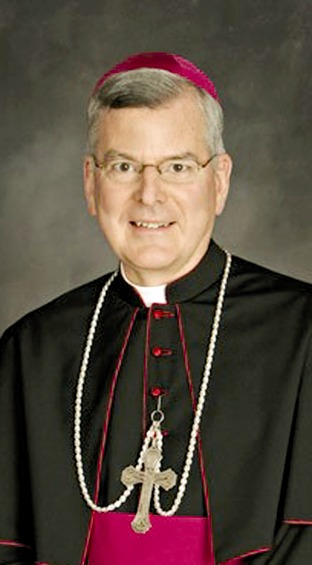Church leaders say amendment that would ban gay marriage is a top issue in 2012 election.
(Really bishops? This is your top issue? Not jobs, not economic equity, not poverty, not justice? Shame on you!)
Minnesota’s Roman Catholic bishops are taking the unusual step of urging parish priests across the state to form committees to help get the proposed marriage amendment passed by voters in 2012.
“It is imperative that we marshal our resources to educate the faithful about the church’s teachings on these matters, and to vigorously organize and support a grass-roots effort to get out the vote to support the passage of this amendment,” Twin Cities Archbishop John Nienstedt wrote in a letter to his priests dated Oct. 4.
“To give a sense of the scale, in 2009, more than $9 million was spent for and against Maine’s Question 1, a popular referendum to overturn the Legislature’s legalization of gay marriage,” Smith said.
Adkins, with the Minnesota Catholic Conference, declined to say how much money the Catholic Church has spent so far — or plans to spend — in its campaign.
Tegeder said he believes the archbishop should be devoting more of the archdiocese’s resources toward fighting poverty and hunger and other issues.
The Rev. James G. Wolnik, pastor at Church of the Holy Childhood in St. Paul, said he doesn’t have a problem with the committees and sees it as the church’s mission to inform Catholics about its stance on gay marriage.
“We are certainly not in favor of somehow changing marriage as it has been understood from the beginning. God, as far as we’re concerned, made marriage between one man and one woman.”
Full Article HERE!
The letter asks parish priests to “appoint a captain or co-chairs to lead a special parish ad hoc committee to spearhead this effort.”
Coming more than one year ahead of the November election, the move is the latest sign of the early intensity surrounding the amendment to change the state’s Constitution to define marriage as the union of one man and one woman.
Catholic leaders say they are taking this “unique” and unusual step because they see the amendment as one of the most important issues the state’s Catholics will have to consider in the coming year.
With nearly 1.1 million Catholics in Minnesota, the organizing effort could be a powerful force in getting boots on the ground to support the amendment. But Catholics tend to be a diverse group, not a monolithic voting bloc, and many could vote against the amendment or take umbrage at the church pushing for it.
Pros and cons
Jason Adkins, executive director of the Minnesota Catholic Conference, the public policy arm of the Catholic Church in Minnesota, said the state’s other bishops are expected to send out similar letters, “if they haven’t already done so.”
“We believe it [marriage] is a vital social institution, and it’s under attack in the courts, the Legislature and the culture,” Adkins said. “And it would have profound consequences if marriage is in fact redefined. That’s why we’re putting extraordinary resources toward making sure this marriage amendment gets passed.”
But the Rev. Mike Tegeder, pastor at both St. Frances Cabrini and Gichitwaa Kateri churches in Minneapolis, said he spoke up against the effort at a meeting of priests and the archbishop this week.
Tegeder, a frequent critic of Archbishop Nienstedt’s policies, said he believes the letter calling for parishes to form committees to organize a get-out-the-vote effort is “imprudent” and “divisive.”
“There’s all kinds of wonderful ways to promote marriage, which I do on a regular basis and other churches are doing,” he said. “You don’t promote marriage by taking away the rights of a small segment of the population, many of whom are not Catholic or have no connection to the Catholic Church.”
Religion and politics expert John Green said he’s never heard of U.S. Catholic leaders encouraging clergy to form special committees at churches to mobilize Catholics to vote on particular issues.
“Oftentimes Catholic bishops ask priests to read letters … or let it be known the church definitely has a position on a certain issue,” said Green, professor of political science at the University of Akron, who studies politics and religion. “But actually instructing people to organize committees to support a ballot issue is very unusual.
“It may be very divisive,” he added. “Roman Catholic parishes tend to be large and diverse.”
Green also said he doesn’t think the church has violated its tax-exempt status “as long as it stays focused on the issue. If it got involved in any way with partisanship, with a political party or with a candidate, it would be highly problematic.”
Minnesota’s Catholic bishops made another unorthodox move before last fall’s legislative elections when they mailed DVDs to nearly 400,000 Catholics across the state, with a message encouraging them to support a state amendment defining marriage between a man and woman. That DVD prompted a complaint to the state’s campaign finance regulators, though the outcome is not clear yet.
Political battle taking shape
The bishops join other faith-based groups already gearing up for the heated political battle ahead.
Among them are members of Minnesota for Marriage, a coalition of groups formed in an effort to get the marriage amendment approved. The group includes the Minnesota Family Council and the National Organization for Marriage.
On the other side is Minnesotans United for All Families, a coalition that includes a number of more liberal-leaning faith-based groups opposed to the marriage amendment.
Unlike 2004, when there were 11 measures opposing same-sex marriage on the November ballot, Minnesota is likely to be the only state deciding on such a measure in 2012. As such, millions in out-of-state dollars will flow into the state, supporting and opposing the referendum, said Daniel A. Smith, a political science professor at the University of Florida.
